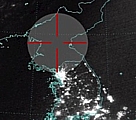 |
|
North Korea mistakenly believes there are U.S. nuclear weapons in South Korea. |
By Hans M. Kristensen
The North Korean newspaper Rodong Sinmun reportedly has issued a statement saying the U.S. has 1,000 nuclear weapons in South Korea. In this regional war of rhetoric it is important to at least get one fact right: The United States does not have nuclear weapons in South Korea. It used to – at some point close to 1,000 – but the last were withdrawn in 1991.
The only nuclear weapons the United States has in the Pacific today are the hundreds of warheads deployed on Trident II D5 sea-launched ballistic missiles on board eight Ohio-class nuclear-powered submarines patrolling in the Pacific Ocean. Some of them may be earmarked for potential use against targets in North Korea. Other weapons for bombers could be moved into the region if necessary, but they’re not today.
The North Korean obsession with the U.S. nuclear “threat” might be seen as confirmation that the nuclear deterrent works and hopefully will deter North Korea from attacking anyone. But the flip side of the coin is to what extent the U.S. nuclear posture in the Pacific – past and present – helps feed the North Korean nuclear rhetoric and perhaps even ambitions.
Additional information: A history of U.S. nuclear weapons deployment to and withdrawal from South Korea.
The Pentagon’s new report provides additional context and useful perspectives on events in China that took place over the past year.
Successful NC3 modernization must do more than update hardware and software: it must integrate emerging technologies in ways that enhance resilience, ensure meaningful human control, and preserve strategic stability.
The FY2026 National Defense Authorization Act (NDAA) paints a picture of a Congress that is working to both protect and accelerate nuclear modernization programs while simultaneously lacking trust in the Pentagon and the Department of Energy to execute them.
While advanced Chinese language proficiency and cultural familiarity remain irreplaceable skills, they are neither necessary nor sufficient for successful open-source analysis on China’s nuclear forces.